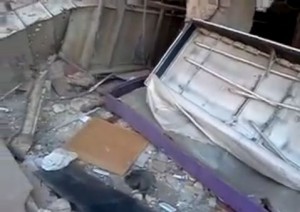Syrians Face Shortage of Vital Medications

(Damascus, Syria) – Asaad Ali, 60, who suffers from epilepsy, requires 100 milligrams of the epilepsy drug Phenytoin each day.
“The drug is still available, but in very limited amounts,” explained his daughter Souad, 33, adding that acquiring the medicine “now requires trips to several pharmacies.”
Mona, 30, a pharmacist in Qassaa, confirms Souad’s experience, explaining that there is a shortage of most anti-seizure and blood pressure medications. She says neurological drugs with supplements and anti-inflammatories for bowel conditions and dental issues are also not available but that alternatives exist.

The government-owned Baath newspaper quoted a member of the Syrian Union of Physicians as saying that around 30 out of 90 medical supply plants have stopped working due to damage and looting.
Ali isn’t the only patient suffering, but he nevertheless fares better than many others with chronic illnesses whose drugs are no longer available. Most medications for cancer tumours and immunity enhancement, growth hormones, solutions for liver diseases such as hepatitis, diabetes medication, as well as drugs to treat osteoporosis are now very difficult to acquire, according to the staff of the government-owned Central Pharmacy in Damascus.
Staff members who spoke on condition of anonymity confirmed that pharmaceutical products produced by the government-owned companies Domna, City Pharma and Tamico have all but completely been cut out of the market.
The Minister of Health Saad al-Nayef was quoted by the government-owned daily Tishreen as saying that there are 62 different drugs that are no longer on the market, but none of which are drugs that treat otherwise fatal illnesses.
He claimed that a large part of the drug shortage problem has to do with Syrian citizens not accepting to use substitutes for certain drugs, preferring instead only the packaging and pills that they’re used to.
The World Health Organization’s Regional Committee for the East Mediterranean agreed to provide the Syrian Ministry of Health with the latest polio vaccines in order to inoculate all Syrian children under the age of five, gradually providing for all of Syria’s needs for the vaccine until the end of next February.
Official reports indicate that before the crisis, Syrian domestic pharmaceutical production once provided for about 93 per cent of the local market’s needs, and that Syrian-produced drugs were also exported to 58 different countries around the world.
Aram, 35, is the owner of a pharmacy in the Bab Touma neighbourhood of old Damascus. He said that pharmacists have taken a hit to their business due to certain drugs not being available and the reduction of their profits by half. Aram blamed the shortage of drugs on “the increase of prices, the cost of transport, and the monopoly that some warehouses have maintained on certain drugs in order to sell them at higher prices,” he said. “Many blood pressure medications, for example, are stockpiled at the warehouses until they sell all the alternative stock.”
A senior source at the Ministry of Health who wished to remain anonymous told Damascus Bureau that there are indeed private distributers with monopolies over certain medications. He maintained, though, that drug stockpiling and monopolizing exists globally, as do counterfeit drugs, and is not limited to a single country.
The source at the Ministry of Health confirmed that the rise in the price of locally-produced drugs is caused by the rise of the cost of raw materials used in the pharmaceutical industry due to the deterioration of the Syrian pound’s exchange rate. But he confirmed that the new hike in prices that was decided by the government was “studied and measured to satisfy the needs of local industry as well as citizens’ capacity.”
The increase in prices was 50 percent for medications under 100 Syrian pounds (around 69 cents), 10 percent for those between 100 and 200 Syrian pounds, and a five percent increase for those between 200 and 500 Syrian pounds.”
As for imported drugs, the source said that they are “subject to new pricing every three months depending on inflation and exchange rates, but they are still generally available at lower prices than their counterparts in other countries.”
In a report issued in March, Doctors Without Borders described the health situation in Syria as catastrophic.
“Medical aid is now targeted, hospitals are under attack and subject to damage and health practitioners are being chased out,” said Marie-Pierre Allié, president of the organization.
One of the reports issued by the Doctors Without Borders mentions that 57 percent of Syrian hospitals have been damaged as a result of the conflict, and only 36 percent of these have been able to continue operating. These statistics don’t count the private clinics and unofficial hospitals that have been damaged or destroyed.
Bassem, 40, a doctor at the government hospital Al-Muwasat in Damascus , said medical convoys are attacked without specifying the side involved in the attacks. He expressed sadness over the death of a patient treated at the hospital due to kidney failure, after doctors were unable to secure the necessary medications to save her life, a result of the acute shortage of medical supplies.
Dr. Bassem also indicated the dire need for burn medicine, given the high incidence of explosions and resultant burn wounds. He said that medications that were produced in areas under opposition control are insufficiently available in the stocks of the Ministry of Health, and hence there are shortages of such medication in health centres under government control, like the one he works in.
